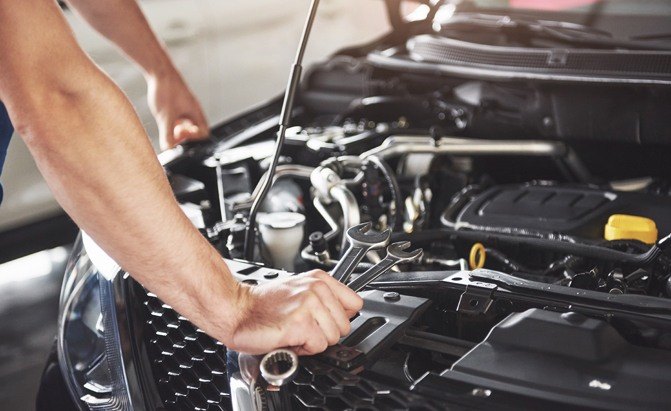10 Car Maintenance Tips to Keep Your Vehicle Running Problem Free

From changing your spark plugs to keeping your tires properly inflated, we are giving you 10 tips to keep any car, truck, or SUV running problem free for years. And we’ll be sure to include plenty of advice on tools to help you achieve that goal—from impressive-yet-affordable digital tire pressure monitors, to custom tools that’ll make changing spark plugs a cinch.
While modern cars don’t require the same level of maintenance compared to machines built decades ago, there are still more than a few actions the smart driver can take to keep their rig running smoothly for years to come. Here are our top car maintenance tips to help ensure your pride and joy stays in top shape.
Under Pressure
Photo credit: Africa Studio / Shutterstock.com
As the only part of your car that actually touches the ground, if your tires are in poor shape or not up to the task of gripping the road, even the most advanced active safety equipment can't perform to the best of its ability.
1. Owning and knowing how to use a tire pressure gauge is the first step to keeping your ride's rubber in good condition. Simply eyeballing a tire to determine if it is properly inflated is a bad idea; by the time a tire is visibly low on air, it has lost a dangerous amount of pressure.
2. Checking tire pressure will also provide the chance to examine the condition of tread on your car's tires. Look for cracks in the rubber, surfaces that have been worn out, and debris which may have been picked up though normal driving. Then head to your trusted mechanic for tire replacement if the rubber is worn or damaged.
Charged Up
Photo credit: Bulgn / Shutterstock.com
If you're storing a vehicle for several weeks or months – especially one from the modern era – there's a good chance its battery will degrade over time. (This could be due to any number of causes, from the clock that's keeping time to the radio that continues to remember its presets long after you've put it away for the winter.)
3. Since some cars react poorly to sitting for long periods of time with their battery disconnected, it's a good idea to consider connecting a battery maintainer before tucking the vehicle in for its extended stay. These products maintain a specific level of battery charge, permitting small computerized items to draw the power they need without leaving owners with a handful of no-go when it's time to start back up.
4. Learn the difference between low-cost battery maintainers and high-quality ones which have auto-off and float These features permit the unit to stop force-feeding power into the car's battery when it is fully charged, then turn back on when electrons are needed. This helps prevent overcharging—which can prove both dangerous and expensive.
Getting a Boost
Photo credit: 13_Phunkod / Shutterstock.com
Even the most careful driver can get caught with a dead battery. Leaving the headlight on by accident, failing to turn off an interior light, or simply partying into the wee hours using the car's radio as a DJ can all conspire to severely run down your ride’s battery.
5. This is where a good-quality battery booster pack can be a life-saver. (Be sure to look for a unit that has a dedicated on/off switch.) Some packs rely on the battery that's being boosted to still have a smidgen of electrical charge to 'wake up' the booster pack. This will be less than helpful when trying to revive a battery that’s deader than disco.
6. Understand how car batteries work, and always be sure to read instructions that accompany a booster pack. Use caution when attaching the positive and negative cables, and always keep clear of open flames when juicing a battery back to life.
Sparking Conversation
Photo credit: Evgenius1985 / Shutterstock.com
Checking and replacing the spark plugs on a modern gasoline-powered engine isn't generally something that needs to be done with much frequency. But if you’re taking a collector car out of storage, it's a good idea to know the basics of spark plug maintenance.
7. Invest in proper tools for the job like sockets, ratchets, and extensions. Be sure to research what's required and pick up the right items before setting to work. The lack of consistent spark will cause most gasoline engines to run poorly (or not at all), so this piece of the internal combustion puzzle is every bit as important as gasoline or airflow.
8. True gearheads will have a tool to measure spark plug gap, which is the amount of space between the center and side electrodes. Properly set gaps will produce an electrical arc of the correct voltage, helping the engine to run at peak efficiency.
Clean Getaway
Photo credit: GBALLGIGGSPHOTO / Shutterstock.com
There's a strong case to be made that the simple act of cleaning one's car can ward off potential problems—or at least provide the opportunity to notice that something crucial is amiss before it becomes a major issue.
9. Picking up some good quality car washing tools—including a soft mitt or sponge, proper suds, and drying towels—are a great way to get started. Always be sure to use two buckets of suds, one filled with clean water and one in which to rinse the dirty mitt. Never use household dish soap as it contains elements which can harm a car's delicate surface.
10. While washing, pay attention to any new body damage or rust that may have appeared since your last wash. If you do find problems, make a plan to take your car into a trusted mechanic and have those issues fixed before they become real headaches.
We are committed to finding, researching, and recommending the best products. We earn commissions from purchases you make using the retail links in our product reviews. Learn more about how this works.
Photo credit: Standret / Shutterstock.com

Living in rural Canada, Matthew has immersed himself in car culture for over 30 years and relishes the thought of a good road trip. A certified gearhead, he enjoys sharing his excitement about cars and is very pleased to contribute at AutoGuide. Matthew is a member of Automotive Journalists Association of Canada (AJAC).
More by Matthew Guy





































Comments
Join the conversation